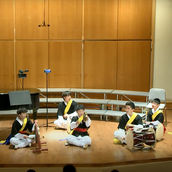ELIZABETH BEAVERS
Hamkke We Sing: A Celebration of
Korean Choral Music
Exploring Korean Choral Traditions Through Performance and Scholarship
Supported by the Presser Graduate Music Award


Hamkke We Sing was a collaborative initiative to promote Korean choral music and foster intercultural exchange. The word hamkke (함께) means together in Korean, reflecting the project’s core message of unity through shared musical experience. The project included a 30-day research trip to South Korea in June 2024, where I studied repertoire, attended rehearsals, interviewed composers and conductors, and explored Korea’s choral scene. The culmination was a December 2024 concert at Temple University uniting Korean and non-Korean musicians from the local community.
The program featured five Korean choral works, traditional instrumental solos, a percussion ensemble, and art songs. Brief, interactive lectures provided context and educational moments to deepen audience engagement. The project highlights Korea’s musical heritage, contemporary innovation, and the potential for cross-cultural collaboration.
Hamkke We Sing was made possible by the Presser Graduate Music Award, which allowed me to conduct in-depth research in South Korea and bring authentic Korean choral music to the United States through performance, collaboration, and educational outreach.
As a non-Korean conductor, I am passionate about sharing the richness of Korean choral music with Western choirs. I believe that, with careful study, dedication to style, and respect for pronunciation and expression, choirs outside Korea can perform this repertoire authentically and meaningfully. Hamkke We Sing celebrates not only the artistry of Korean composers but also the ability of music to connect people across cultures.
Find my full conductor's note in the program below.


Phase 1: Research in South Korea
In June 2024, I traveled to South Korea for a 30-day immersive research experience. I met with leading conductors and composers, attended rehearsals, interviewed experts, and explored the country’s vibrant choral scene. This hands-on study allowed me to collect repertoire, learn essential Korean rehearsal vocabulary, and gain insight into the musical and cultural nuances of Korean choral traditions.
Phase 2: Collaborative Performance at Temple University
The project culminated in a December 2024 concert at Temple University, uniting a diverse group of Korean and American musicians, including Koreans living in the U.S., Temple University students, and community members. Before our performance, we shared a meal of kimbap and ramen. Shared meals are a key part of Korean culture that helped build rapport and foster connections among participants. The program featured five Korean choral works, traditional instrumental solos, percussion ensembles, and art songs, accompanied by brief lectures and audience participation. This interactive performance highlighted Korea’s musical heritage and contemporary innovation while celebrating intercultural collaboration and shared musical experiences.
Program
Non Mea Sed Tua – Isong Lee
Isong Lee, piano vocal solo
Milyang Arirang – Suyoung Jegal
Adrianna Barnett, soprano
Julian Nguyễn, tenor
Love Song in Winter – Paul Shin
Cheongseong-gok - Traditional Daegeum
Woosung Jung, daegeum
Samulnori Percussion Ensemble
Students of the Korean School of Southern New Jersey
Golden Grass – Hyeyoung Cho
Woosung Jung, daegeum
Kay Meyer, oboe
Kim Barroso and Joohee Kim, piano
Evocation – Hyeyoung Cho
Jina Jang, soprano
Joohee Kim, piano
Alleluia – Hyowon Woo
Roberto Guevara, tenor
Arirang – Hyowon Woo
Woosung Jung, daegeum
Students of the Korean School of Southern New Jersey
Impact
Hamkke We Sing successfully deepened understanding and appreciation of Korean choral music for both performers and audiences. Participants gained confidence singing unfamiliar repertoire, strengthened their linguistic and musical skills, and developed a greater awareness of the cultural and expressive nuances of Korean music. The project fostered meaningful collaboration among Korean and non-Korean musicians, built lasting professional connections, and demonstrated that Western choirs can perform this repertoire authentically with dedication and care. Audiences responded enthusiastically, and the live-streamed performance extended the project’s reach globally. The experience strengthened my career as a conductor and advocate for Korean choral music, and I look forward to expanding these efforts, continuing to share Korean repertoire, and fostering intercultural musical exchange in the years to come.




































